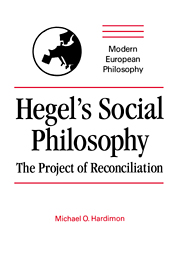Book contents
- Frontmatter
- Contents
- Acknowledgments
- List of abbreviations
- Introduction
- Part I An approach to Hegel's project
- Part II The project of reconciliation
- 4 The anatomy of the project
- 5 Individuality and social membership
- 6 The family, civil society, and the state
- 7 Divorce, war, and poverty
- Conclusion
- Selected bibliography
- Index
6 - The family, civil society, and the state
Published online by Cambridge University Press: 10 December 2009
- Frontmatter
- Contents
- Acknowledgments
- List of abbreviations
- Introduction
- Part I An approach to Hegel's project
- Part II The project of reconciliation
- 4 The anatomy of the project
- 5 Individuality and social membership
- 6 The family, civil society, and the state
- 7 Divorce, war, and poverty
- Conclusion
- Selected bibliography
- Index
Summary
Hegel's account of the modern social world represents the culmination of his project of reconciliation. It is here that he seeks to show that the modern social world is in fact a home. My purpose in this chapter and the next is to provide a reconstruction of this final stage of his argument. In this chapter, I present Hegel's account of the structure of the modern family, civil society, and the modern state. I explain how, according to Hegel, these institutions make it possible for modern people to actualize themselves as individuals and as social members.
Throughout the discussion that follows it will be crucial to bear in mind that Hegel presents his treatment of the modern social world neither as a purely descriptive account of the de facto features of existing modern institutions nor as a purely normative account of how these institutions ought to be. As we saw in Chapters 2 and 4, Hegel instead presents his theory of the modern social world as an account of the ‘actuality’ (Wirklichkeit) of the family, civil society, and the state in his technical sense of the term. That is, he presents it, on the one hand, as an account of the underlying essences of these institutions, insofar as their essences are realized in existing institutions and groups, and, on the other hand, as an account of existing institutions and groups, insofar as they realize their essences.
In discussing Hegel's conception of the modern family, civil society, and the modern state, I examine each of these institutions in turn.
- Type
- Chapter
- Information
- Hegel's Social PhilosophyThe Project of Reconciliation, pp. 174 - 227Publisher: Cambridge University PressPrint publication year: 1994



